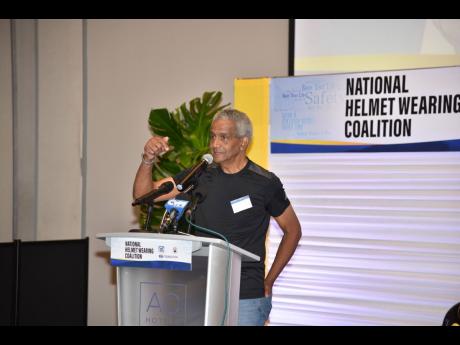‘Helmets save lives’, says crash survivor McFarlane
National Helmet-Wearing Coalition launched
WHEN HE was 18 years old, retired public servant and radio broadcaster John McFarlane was involved in a near fatal bike crash.
He recalls riding down Half-Way Tree Road, before a taxi that was headed in the opposite direction swerved in his direction and hit him off his bike.
“My leg was broken so I couldn’t move much, the helmet is still on my bed, but the whole side is torn off, my gloves are gone completely, all my knuckles were damaged, my hair off my face, a big gash on my chin,” he said, adding that he was assisted to hospital by a doctor.
Sharing that he has lived a “full life” since then, serving in the Jamaica Defence Force and in leadership roles across various government agencies such as the Port Authority and the Transport Authority McFarlane, now 75 years old, soberly acknowledged that he is alive because he was wearing a helmet on that fateful night.
“Had I not been wearing a helmet, today I would not have been here with you,” he said.
McFarlane was speaking at the launch of the National Helmet Wearing Coalition, an initiative to encourage helmet-wearing among motorcyclists and pillions in Jamaica, held at the AC Marriott Hotel, yesterday.
The coalition, spearheaded by the National Road Safety Council in partnership with the JN Foundation and the UK-based FIA Foundation, comes against the background of increasing high levels of road crashes and fatalities among motorcyclists in Jamaica.
Since 2019, motorcycle fatalities accounted for more than 30 per cent of all road fatalities, with data from the Island Traffic Authority indicating that for crashes involving motorcycles, 80 per cent of the riders without helmets usually sustain fatal or severe head injuries.
Motorcyclists account for 37 of the 91 people who have been killed in road crashes since the start of the year.
Tragic consequences
McFarlane lamented the tragic consequences of motorcyclists not wearing a helmet, which he said also results in tremendous loss to the country.
“Who knows where any of those 37 would have been?” he asked. “I have lived to be of some value and some use to this country. Where would those others have been had they not died?
“When we lose these people, we’re not just losing a body, we’re losing a potential and we’re affecting families, and fathers are broken,” he added.
Director of the JN Foundation, Earl Jarrett, outlined that the coalition, through advocacy and engagement programmes, intends to address widespread issues impacting helmet usage including the lack of awareness about the regulation, low awareness among riders about helmet standards and proper use, and the presence of counterfeit helmets on the island.
It also intends to build a sustainable demand for affordable and safe helmets in Jamaica in order to increase the rate of helmet-wearing, and reduce head injuries and fatalities.
“Through this project, the JN Group and the JN Foundation reaffirm our steadfast commitment to advocating for change. As we have done in the past, we are willing to engage like-minded stakeholders who have this shared objective of saving the lives of our citizens,” he said.
Meanwhile, executive director of the FIA Foundation, Saul Billingsley, noted that motorcyclists prioritising helmet-wearing is one of the most “complex issues facing road safety”.
However, he stressed that the focus cannot only be on rider behaviour, but equal effort must be placed in ensuring that helmets available are up to standard.
“Government can ensure that regulations are met so that we have helmets which meet the standards, are certified, are safe. That is the foundation of the success of enforcement. If the police know what the standards are, they know that the only helmets available meet those standards makes it much more effective and targeted to ensure,” he said.
Billingsley emphasised that non-safe helmets are “almost just as bad” as not wearing a helmet.
Vice Chairman of the NRSC, Dr Lucien Jones, shared that the coalition has also been advocating for the regulations, which ensure that helmets are purchased along with a motorcycle.
“It’s a proposal … it’s a very worthy suggestion which we are contemplating,” he said.

